Trade is one highly significant part of Africa’s story. Its pre-colonial, colonial and post-colonial transitions are all marked by trade. But for many years, African trade has struggled with several challenges: poor infrastructure, high transaction costs, opportunism and unfriendly policies. So when President Bill Clinton signed the African Growth and Opportunity Act (AGOA) in 2000, African countries were given a competitive edge by providing unilateral duty-free exports for 6,500 products from Africa to the United States.
But that reality is changing for some countries. On January 1st, 2022, the US officially barred Ethiopia, Guinea and Mali from accessing the AGOA. The move comes two months after president Joe Biden told Congress that he plans to cut off the three countries from the program over coups and alleged human rights violations, which put them in violation of the program’s eligibility requirements.
A lot of groups and individuals have condemned the US government’s decision. Ethiopia’s Investment Commission described the sanction as disappointing and very regrettable. Meanwhile, other groups such as the American-Ethiopian Public Affairs Committee (AEPAC) have tried to lobby the White House to reconsider, but all to no avail.
Why these countries were barred
This is not the first time the US is delisting countries. As of 2020, 38 countries were eligible for AGOA benefits. The requirement for eligibility is that the countries involved must establish conducive environments for democracy and human rights. Mali is getting the stick for the second time. The first time was when President Obama removed it in 2013 over a coup. Ethiopia has been in the midst of a civil war since November 2020, which has already left thousands of people dead and displaced more than 2 million. In Guinea, military officer Mamady Doumbouya has been running the country as an interim minister since October, after he led the country’s armed forces in a coup the previous month. And in Mali, Assimi Goïta, a military officer, has been serving as interim president since May 2021, when he led the army to a coup.
Why does it matter?
In 2019, African countries exported goods worth $8.4 billion to the US under AGOA. The agreement has helped participating countries develop products for US consumers, grow industries, and create jobs. For example, it helped to create a huge textile industry in Ethiopia. From 2000 to 2020, the country exported garments worth $722 million to the US duty-free, including to major American fashion labels such as Calvin Klein and Tommy Hilfiger. By taking advantage of the AGOA, Ethiopia’s poverty dropped by 42 per cent in the same period. Mali has also benefited from exporting arts and antiques to the US, and Guinea has benefitted from aluminium exports.
The removal of the three countries from the AGOA program and the tensions in the countries threaten economy-driving industries which employ thousands and will likely rattle investors. Already, the global clothing company PVH Corp, which includes brands such as Tommy Hilfiger and True & Co., has said it is closing its manufacturing facility in Ethiopia due to the crisis in the country. PHV Corp, which entered Ethiopia together with other American companies because of the Ethiopian government’s drive to build industrial parks to make apparel and footwear for export, announced its decision two weeks after Biden’s statement in November.
The AGOA decision will cause these countries to start cultivating markets elsewhere. China has already announced new investments in Ethiopia since the US announced the country’s delisting from AGOA. So it’s very likely that Africa’s largest creditor establishes a new market.
Written by Oluwatosin Ogunjuyigbe








